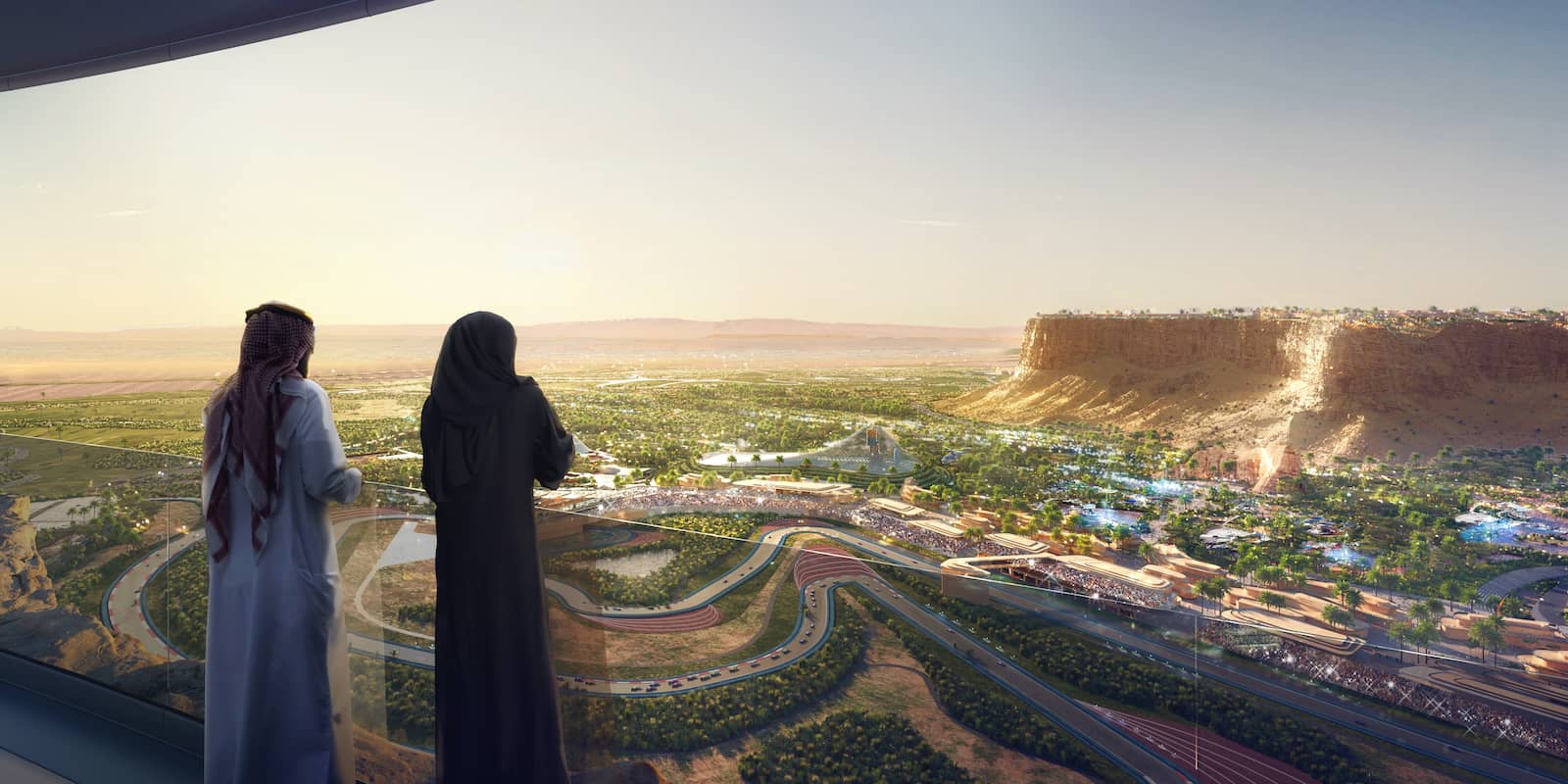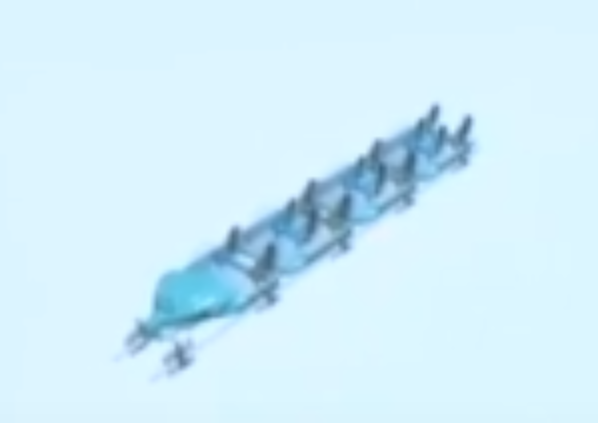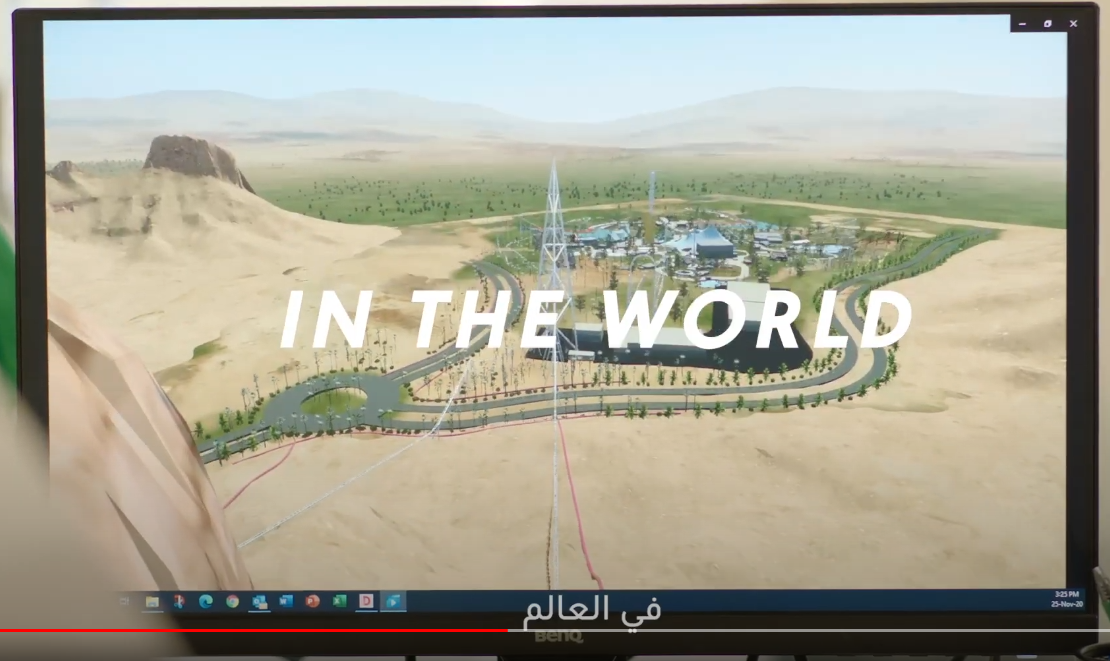FORUMS - COASTERFORCE
You are using an out of date browser. It may not display this or other websites correctly.
You should upgrade or use an alternative browser.
You should upgrade or use an alternative browser.
Six Flags Qiddiya | Saudi Arabia | Theme Park
- Thread starter Matt N
- Start date
Coaster Chall YouTube
Hyper Poster
I do think with the Qiddiya group involved, this park will be built but 50/50 delays till 2026-2030... But will be built eventually. Like London Resort, delayed for years and now its reportedly 70-80 percent nearly done for submission of final plans so we'll have completion
I took the liberty to change the thread title a little, as we know Six Flags are only leasing their name to this park, they aren't building it.
In all likelihood, neither will Qiddiya Group, but hey, can't blame Six Flags for that.
In all likelihood, neither will Qiddiya Group, but hey, can't blame Six Flags for that.
bernatc22
Mega Poster
Bruh this is the park we all used the draw when we were kids; giant 500ft coaster going through the back and all!
Too bad the chances of this happening right now are about 1/10
Pear
Strata Poster

Six Flags Qiddiya to bring year-round thrills to Saudi Arabia
With a striking setting close to Riyadh, one of Saudi Arabia's biggest giga-projects will soon be home to Six Flags Qiddiya.
Perhaps the most interesting thing is about Falcon's Flight
“You’ve probably seen the video,” says Machamer. “The visuals that you see, the coaster going up the cliff face; that’s all happening. There’s already been geotechnical testing and analysis of the cliffs.”
emoo
Hyper Poster
A park bigger than WDW with the best theming Six Flags have done. Using a RCT3 for on ride footage is just one of the many face palms so even if this has been jabbed at before, it really needs hammering home.
The similarities are strong with the UK resort. Who will fulfil most of the promises ?
The similarities are strong with the UK resort. Who will fulfil most of the promises ?
MatthijsFB15
Roller Poster

Just read this article and imagine this Intamin coaster!??
'The Falcon’s Flight is set to become the world’s longest, fastest and tallest coaster. It will travel across approximately 4km, feature a vertical cliff dive maneuver into a 160m-deep valley using magnetic motor acceleration (LSM technology), and achieve unprecedented speeds of 250+ km/h.'
'The Falcon’s Flight will also be the world’s tallest free-standing coaster structure featuring a parabolic airtime hill allowing a weightlessness airtime experience.'
'On each ride – a three-minute long adventure – up to 20 passengers will experience the exhilaration of three electromagnetic propulsion launch systems as well as panoramic views of Six Flags Qiddiya and the Resort Core.On each ride – a three-minute long adventure – up to 20 passengers will experience the exhilaration of three electromagnetic propulsion launch systems as well as panoramic views of Six Flags Qiddiya and the Resort Core.'
Y'all happy that Intamin did got this project?
Last edited:
Peet
Giga Poster
Nah I was hoping it would be S&S - we could all do with a few laughs around hereY'all happy that Intamin did got this project?
Projektion
Mega Poster
I'm scared that we live in a world where this might actually get finished.
CrashCoaster
CF Legend
Imagine how sexy a 155mph LSM launch would sound. <3
JoshC.
Strata Poster
Humouring this project and going along with the idea it'll happen, I'm confused.
This is going to be the world's tallest roller coaster (>139m) and it will feature a dive into a 160m deep valley. Like, what?
Say the ride starts in said valley (which sounds like a bit of a logistical nightmare, but whatever), then that's a bit more understandable. But then you have the world's tallest roller coaster in a 160m deep valley, vastly reducing its impact, no?
The alternative is that high point of the ride is achieved at some other point, which could well be smaller than than the 160m valley. The article certainly suggests that. Maybe in actuality it will be the roller coaster with the tallest drop? Or I'm just overthinking it.
In any case, a drop of 160m would see the train get to somewhere around 100-120mph. I could see them just doing a boost after that drop to hit the 155mph, rather than a full out launch from slow to 155mph.
On top of that, the craziness of the stats is just, well, crazy. 4000m+ in length (1.6 times longer than Steel Dragon at a minimum), 3 minute ride time of a very fast ride featuring 3 launches, plus something exceeding 140m in height (potentially). It just sounds like something which pushes the limit of what is actually enjoyable, and more something which will either end up being a chore to ride, or verging on an endurance test.
I love how they push the "parabolic air time" hill too as a key selling point in these press releases, as if that's a big and unique thing. The whole thing is just a load of buzzwords and yeah, I still don't see it happening. And honestly, I'm not sure I want this to happen...
This is going to be the world's tallest roller coaster (>139m) and it will feature a dive into a 160m deep valley. Like, what?
Say the ride starts in said valley (which sounds like a bit of a logistical nightmare, but whatever), then that's a bit more understandable. But then you have the world's tallest roller coaster in a 160m deep valley, vastly reducing its impact, no?
The alternative is that high point of the ride is achieved at some other point, which could well be smaller than than the 160m valley. The article certainly suggests that. Maybe in actuality it will be the roller coaster with the tallest drop? Or I'm just overthinking it.
In any case, a drop of 160m would see the train get to somewhere around 100-120mph. I could see them just doing a boost after that drop to hit the 155mph, rather than a full out launch from slow to 155mph.
On top of that, the craziness of the stats is just, well, crazy. 4000m+ in length (1.6 times longer than Steel Dragon at a minimum), 3 minute ride time of a very fast ride featuring 3 launches, plus something exceeding 140m in height (potentially). It just sounds like something which pushes the limit of what is actually enjoyable, and more something which will either end up being a chore to ride, or verging on an endurance test.
I love how they push the "parabolic air time" hill too as a key selling point in these press releases, as if that's a big and unique thing. The whole thing is just a load of buzzwords and yeah, I still don't see it happening. And honestly, I'm not sure I want this to happen...
Projektion
Mega Poster
New video. Mostly more of the same promo shots, but it includes some shots of what seems to be the layout proposal in NL2 and the train design looking like the B&M staggered trains.


roomraider
Best Topic Starter
Humouring this project and going along with the idea it'll happen, I'm confused.
This is going to be the world's tallest roller coaster (>139m) and it will feature a dive into a 160m deep valley. Like, what?
Say the ride starts in said valley (which sounds like a bit of a logistical nightmare, but whatever), then that's a bit more understandable. But then you have the world's tallest roller coaster in a 160m deep valley, vastly reducing its impact, no?
The alternative is that high point of the ride is achieved at some other point, which could well be smaller than than the 160m valley. The article certainly suggests that. Maybe in actuality it will be the roller coaster with the tallest drop? Or I'm just overthinking it.
I think you are thinking of this as a classical Valley. It's more along the lines if Monument Valley with the large stone outcrops around.
The ride and park is in the wide Expanse of the "valley" floor and the high point will be on top of one of the large outcrops although the are less isolated here it's more like a large quarry surrounding the park on the lower level like SFFT.


I guess the best coaster to compare this to in that way is Superman at SFFT climbing up the side of the quarry. Just on a much much larger scale.
EDjanaika
Mega Poster
More like, this ride will finish us!I'm scared that we live in a world where this might actually get finished.
Still firmly in the "never gonna happen" camp. This has all the hallmarks of a classic real estate investor bait project that will all run out in the sand with billions of dollars spent and barely a single piece of construction to show for it.
roomraider
Best Topic Starter
Like others I am sceptical this will ever happen. But I'm a bit more optimistic than I am say about London Resort.
For 3 reasons really, 1) if anyone can pull off a project on this scale it's an authoritarian government on a push to diversify into tourism
2) unlike London Resort this project has specific rides named and shown in concept art. By that I mean the rides aren't just generic rollercoaster swirls as seen on the LR concept art, but are of recognisable models and rides.
3) this is the sister Park to Six Flags Dubai and Six Flags China, both of those parks while essentially now dead in their original guise are still moving ahead in one fashion or another, Dubai's rides are going to existing parks and China's Park is still going ahead under Sunacs brand. But my point is they were both projects that got to the point where rides were delivered and construction underway. Unlike say the LR again.
None of these are slam dunk proof anything will happen and I still think its 50/50 but I reckon its got way more of a chance than LR.
For 3 reasons really, 1) if anyone can pull off a project on this scale it's an authoritarian government on a push to diversify into tourism
2) unlike London Resort this project has specific rides named and shown in concept art. By that I mean the rides aren't just generic rollercoaster swirls as seen on the LR concept art, but are of recognisable models and rides.
3) this is the sister Park to Six Flags Dubai and Six Flags China, both of those parks while essentially now dead in their original guise are still moving ahead in one fashion or another, Dubai's rides are going to existing parks and China's Park is still going ahead under Sunacs brand. But my point is they were both projects that got to the point where rides were delivered and construction underway. Unlike say the LR again.
None of these are slam dunk proof anything will happen and I still think its 50/50 but I reckon its got way more of a chance than LR.
All fair points, but they are not without their counterpoints either:Like others I am sceptical this will ever happen. But I'm a bit more optimistic than I am say about London Resort.
For 3 reasons really, 1) if anyone can pull off a project on this scale it's an authoritarian government on a push to diversify into tourism
2) unlike London Resort this project has specific rides named and shown in concept art. By that I mean the rides aren't just generic rollercoaster swirls as seen on the LR concept art, but are of recognisable models and rides.
3) this is the sister Park to Six Flags Dubai and Six Flags China, both of those parks while essentially now dead in their original guise are still moving ahead in one fashion or another, Dubai's rides are going to existing parks and China's Park is still going ahead under Sunacs brand. But my point is they were both projects that got to the point where rides were delivered and construction underway. Unlike say the LR again.
None of these are slam dunk proof anything will happen and I still think its 50/50 but I reckon its got way more of a chance than LR.
For point 1), this can be right even while the project is stranding. Look to Ankapark/Wonderland Eurasia, for instance. It was built, apparently in a scheme to embezzle federal subsidies, yet it never operated as planned and the whole thing quickly folded. Authoritarian governments tend not to have the best procedures for quality control when money for big projects is handed out, and sometimes that's deliberate. Put another way, the Qiddiya developer probably wouldn't have got the green light to develop Qiddiya without strong ties to the government, question remains whether the development is meant as a way to actually develop the area or just channel funds to the developer.
There are plenty of reasons to question the viability of building the world's largest amusement park in the middle of a scorching desert in a country that barely gets any tourism outside of pilgrimage (to sites several hundred kilometers away), yet the funding is generous anyway. That doesn't sound like reasonable development to me, but it reeks of embezzlement, and in those cases the completion of the project is secondary to the main objective: siphoning as much investor money as possible, then hightail it.
For 2), the level of detail in dead-end skyscraper proposals in the UAE and Saudi Arabia in the past have jaded me a little. The old Six Flags Dubailand proposal also had quite recognisable coasters in it, and the proposal was detailed enough to include designs of individual sculptures in the park, yet it still fell flat. Making plans and drawings is practically free. Attaching some names to it is still cheap. Construction is the expensive part, and the one that's generally skipped in projects like this.
And as for 3), well, I think the existence of rides for the Six Flags parks despite the existence of parks to install them in, could itself be a warning sign. It shows that these projects have had a tendency to proceed well into the deliveries phase even while lacking crucial funding for the overall project. Six Flags Dubai did not have the means to complete the park, and while some work was done on site it was a far cry from anything operational, yet the coasters were still delivered. It's really strange that such a fundamentally flawed/underfunded project still got to the phase of ordering coasters from manufacturers.
Again one can draw parallels to the stalled skyscraper projects I follow with some interest. In Dubai alone, there are about a half-dozen sites where towers taller than 300 meters got well into the construction phase before money ran out. For whatever reason, construction was initiated even though the funding was nowhere enough to complete it. The only explanation I can think of is that the act of construction itself was used to build trust with investors. "Look, of course you will be getting your money back. There are workers on site working on the tower right now!". And then it gets to the seventh floor and the contractor stops working because of several missed payments, and the developer has suddenly moved to Aruba and is not available for comment anymore.
Or in other words: the contracts with coaster manufacturers could be allowed to proceed solely as a means to convince investors that work is underway, because manufacturing a coaster is relatively cheap and a very visible way to indicate progress, even though it has little importance to the overall progress of the project. It's easy for an investor to think "well, if they have the coasters underway, surely it means the park is doing well!" and then it turns out the coaster manufacturing is the only part that's adhering to schedule.
So yeah, overall I'm not convinced. That being said, I think the London Resort is even worse off. Then again, that might be because most of the tactics described above are illegal in the UK. LR might just have fewer tools at their disposal to build a convincing smokescreen.
FarleyFlavors
Mega Poster
There could be a more prosaic reason - the collapse of the Dubai housing market since 2014 due to oversupply.Again one can draw parallels to the stalled skyscraper projects I follow with some interest. In Dubai alone, there are about a half-dozen sites where towers taller than 300 meters got well into the construction phase before money ran out. For whatever reason, construction was initiated even though the funding was nowhere enough to complete it. The only explanation I can think of is that the act of construction itself was used to build trust with investors. "Look, of course you will be getting your money back. There are workers on site working on the tower right now!". And then it gets to the seventh floor and the contractor stops working because of several missed payments, and the developer has suddenly moved to Aruba and is not available for comment anymore.















